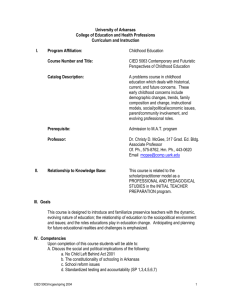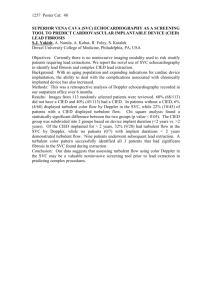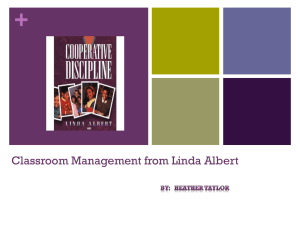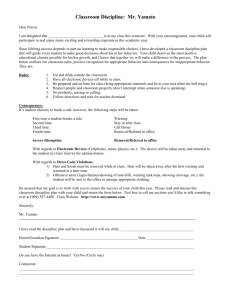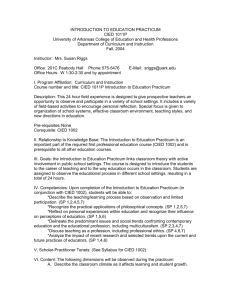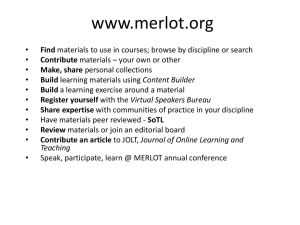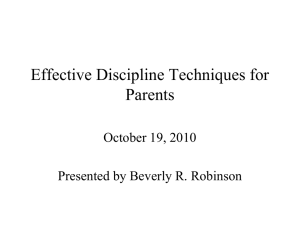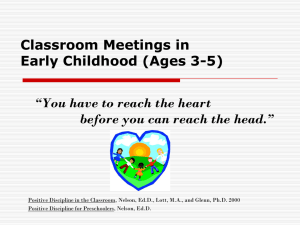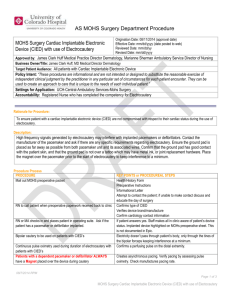CIED 5022 - University of Arkansas
advertisement
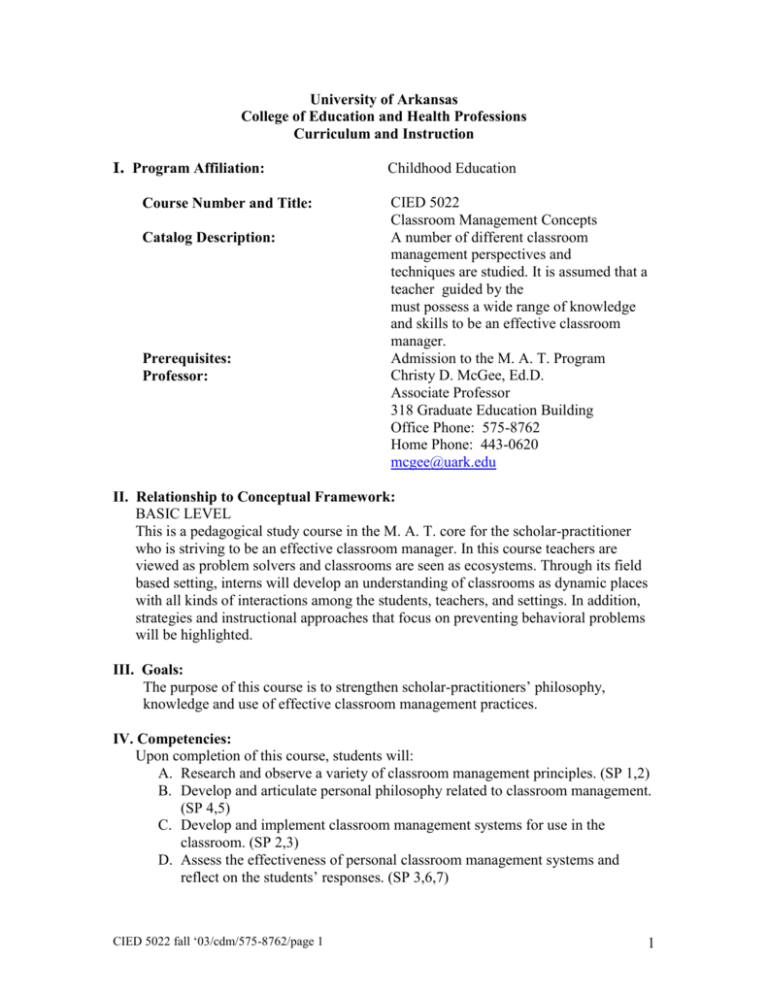
University of Arkansas College of Education and Health Professions Curriculum and Instruction I. Program Affiliation: Course Number and Title: Catalog Description: Prerequisites: Professor: Childhood Education CIED 5022 Classroom Management Concepts A number of different classroom management perspectives and techniques are studied. It is assumed that a teacher guided by the must possess a wide range of knowledge and skills to be an effective classroom manager. Admission to the M. A. T. Program Christy D. McGee, Ed.D. Associate Professor 318 Graduate Education Building Office Phone: 575-8762 Home Phone: 443-0620 mcgee@uark.edu II. Relationship to Conceptual Framework: BASIC LEVEL This is a pedagogical study course in the M. A. T. core for the scholar-practitioner who is striving to be an effective classroom manager. In this course teachers are viewed as problem solvers and classrooms are seen as ecosystems. Through its field based setting, interns will develop an understanding of classrooms as dynamic places with all kinds of interactions among the students, teachers, and settings. In addition, strategies and instructional approaches that focus on preventing behavioral problems will be highlighted. III. Goals: The purpose of this course is to strengthen scholar-practitioners’ philosophy, knowledge and use of effective classroom management practices. IV. Competencies: Upon completion of this course, students will: A. Research and observe a variety of classroom management principles. (SP 1,2) B. Develop and articulate personal philosophy related to classroom management. (SP 4,5) C. Develop and implement classroom management systems for use in the classroom. (SP 2,3) D. Assess the effectiveness of personal classroom management systems and reflect on the students’ responses. (SP 3,6,7) CIED 5022 fall ‘03/cdm/575-8762/page 1 1 E. Understand the cultural implications of classroom management strategies and incorporate that understanding into practice. (SP 3) F. Be familiar with legal/ethical issues related to classroom management. (SP 6) G. Develop effective strategies for communicating with diverse families. (SP 3,5) V. Content: Through discussions, class presentations, case studies and readings the students will explore the following conceptual ideas: A. Introduction 1. Introduction to course a. administrative duties b. discussion of goals of class and relationship to the College of Education conceptual framework 2. Introduction to classroom management a. definitions (classroom management, discipline, misbehavior, etc.) b. overview of the conceptual framework (e.g. why is classroom management important and how it relates to instruction, etc.) c. exploration of cultural and personal goals, beliefs, conceptions and values B. Conceptualization of classroom management 1. Different theories and perspectives 2. Contexts of schools and classrooms 3. Conceptualizations of teaches and students 4. Cultural differences 5. Legal, ethical/moral considerations C. Methods for promoting appropriate behavior and preventing misbehavior 1. Teacher effectiveness research 2. Managing activities and groups 3. Motivating students to learn 4. Establishing a positive classroom climate and effective home school communication. D. Methods for dealing with misbehavior 1. Cognitive methods 2. Social-emotional methods 3. behavioral methods E. Summary, conclusions, and evaluation of course VI. Evaluation: The grade for this course will be determined using the following: A. Learner Profile Cards Each intern will complete a learner profile card on each student in his or her classroom. B. Classroom Environment Design Paper Interns will develop an individual classroom environment design using the Classroom Environment Design assignment and rubric as a guide CIED 5022 fall ‘03/cdm/575-8762/page 2 40 pts. 100 pts. 2 C. Class Participation and Attendance 10 D. Classroom Management Group Assignment Each student will be assigned to a group to research a particular classroom management model. The group will thoroughly review the model, develop a class presentation describing the model, and prepare a handout concerning the model for their classmates. Total Points Possible 50 pts. 200 VII. Syllabus Change The instructor reserves the right to make changes as necessary to this syllabus. If changes are made, advance notification will be given to the class. VIII. Grading Scale: 90 - 100 A 80 – 89 B 70 – 79 C 60 – 69 D Below 60 - F IX. Academic Honesty Academic dishonesty involves acts, which subvert or compromise the integrity of the educational process at the University of Arkansas. Included is an act by which a student gains or attempts to gain an academic advantage for himself or herself or another by misrepresenting his or her or another’s work or by interfering with the completion, submission, or evaluation of work. X. Accommodations Students with disabilities requesting reasonable accommodations must first register with the Center for Students with Disabilities. The CSD is located in the Arkansas Union, room 104 and on the web at: hhtp://www.uark.edu/ua/csd/applications.htm. The CSD provides documentation to students with disabilities who must then provide this documentation to their course instructors. Students with disabilities should notify their course instructors of their need for reasonable accommodations in a timely manner to ensure sufficient time to arrange reasonable accommodation implementation and effectiveness. A typical time frame for arranging reasonable accommodations for students who are registered with the CSD is approximately one to two weeks. XI. Classroom Behavior Appropriate classroom behavior is expected of the instructor and all students. Inappropriate and disruptive classroom behavior (inappropriate language and gestures, class disruptions, disrespect to other students or instructor, and other behavior as determined by the instructor) will not be tolerated and will result in CIED 5022 fall ‘03/cdm/575-8762/page 3 3 possible removal from the class and/or disciplinary action as per the student handbook. INCLEMENT WEATHER Class will follow the Springdale/Fayetteville School Systems closure procedures. Class will not be held when either of these systems is closed. XII. Course Resources A. Mentor Teachers B. Liaison C. Professors D. Colleagues E. Principals XIII. Research Base Texts Cummings, C. (2000). Winning strategies for classroom management. Alexandria, VA: Association for Supervision and Curriculum Development. Kohn, A. (1996). Beyond discipline: From compliance to community. Alexandrian: Association for Supervision and Curriculum Development. Non-Text References Cangelosi, J.S. (2004). Classroom management strategies: Gaining and maintaining students’ cooperation. (5th ed.). Hoboken: John Wiley& Sons. Charles, C.M. (2002). Building classroom discipline (10th ed.). Boston: Allyn and Bacon. Charney, R.S. Teaching children to care: Classroom management for ethical and academic growth k-8. Greenfield MA: Northeast Foundation for Children. Curwin, R.L. & Mendler, A.N. (1999). Discipline with dignity. Columbus, OH: Merrill Prentice Hall. Landau, B.M. (2004). The art of classroom management: Building equitable learning communities (2nd ed.). Upper Saddle Rive, NJ: Pearson Merrill Prentice Hall. Nelsen, J. Lott, L., & Glenn, S. (1993). Positive discipline in the classroom: How to effectively use class meetings and other positive discipline strategies. Rocklin, CA Prima Publishing. CIED 5022 fall ‘03/cdm/575-8762/page 4 4
